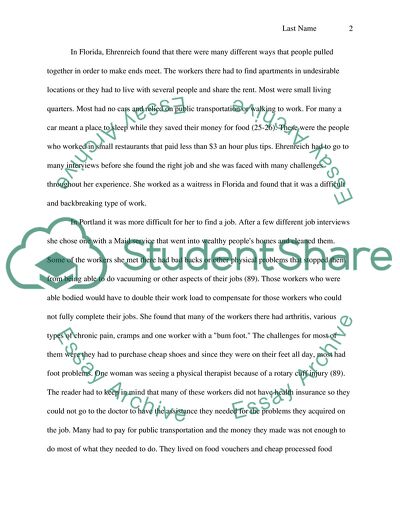
- Home
- Free Samples
- Premium Essays
- Editing Services
- Extra Tools
- Essay Writing Help
- About Us
- Studentshare
- Subjects
- Miscellaneous
- Sociology
Sociology - Essay Example

- Subject: Miscellaneous
- Type: Essay
- Level: Masters
- Pages: 4 (1000 words)
- Downloads: 0
- Author: devinolson
Extract of sample "Sociology"
She found that the hotels were dirty and many were called "flop houses" which means they were just a place to sleep. Most had not amenities like television or refrigerators and most were not very clean. She could have stayed in one city and done her experiment but instead she went to three: Florida, Maine and Minnesota. She wanted to immerse herself into the experience so that she could write about it honestly and thoroughly. Eventually she had six different minimum wage jobs from waitressing to minimum wage.
She also decided not to tell anyone what she was doing and she chose to show that she had no experience. This would make her research more authentic and it would clearly give her an experience that was as difficult as those who worked these jobs everyday. In Florida, Ehrenreich found that there were many different ways that people pulled together in order to make ends meet. The workers there had to find apartments in undesirable locations or they had to live with several people and share the rent.
Most were small living quarters. Most had no cars and relied on public transportation or walking to work. For many a car meant a place to sleep while they saved their money for food (25-26). These were the people who worked in small restaurants that paid less than $3 an hour plus tips. Ehrenreich had to go to many interviews before she found the right job and she was faced with many challenges throughout her experience. She worked as a waitress in Florida and found that it was a difficult and backbreaking type of work.
In Portland it was more difficult for her to find a job. After a few different job interviews she chose one with a Maid service that went into wealthy peoples homes and cleaned them. Some of the workers she met there had bad backs or other physical problems that stopped them from being able to do vacuuming or other aspects of their jobs (89).
...Download file to see next pages Read More
- TERMS & CONDITIONS
- PRIVACY POLICY
- COOKIES POLICY